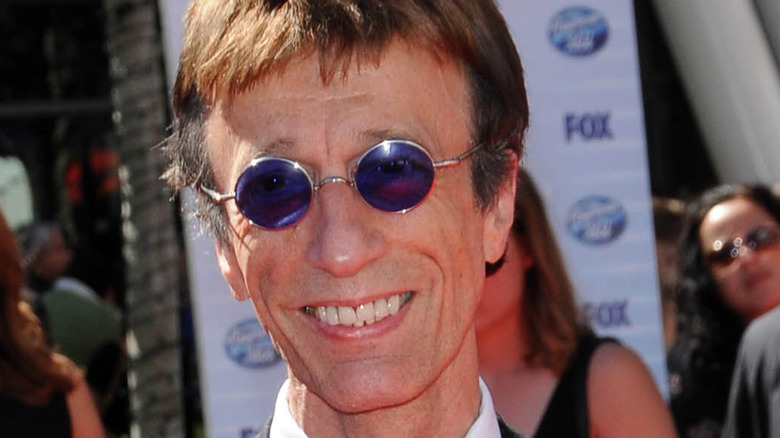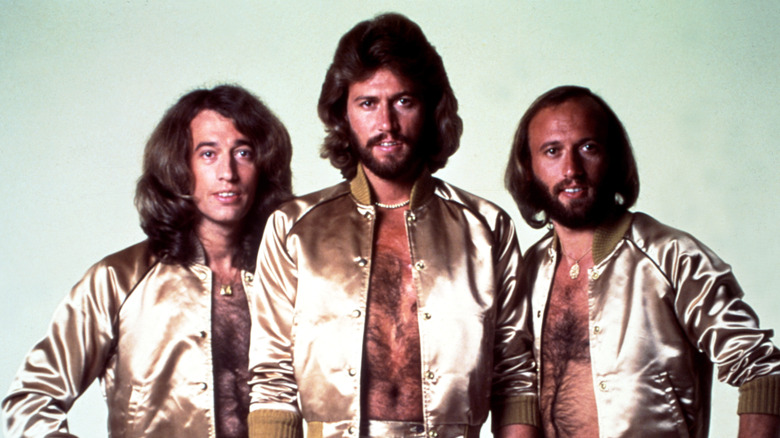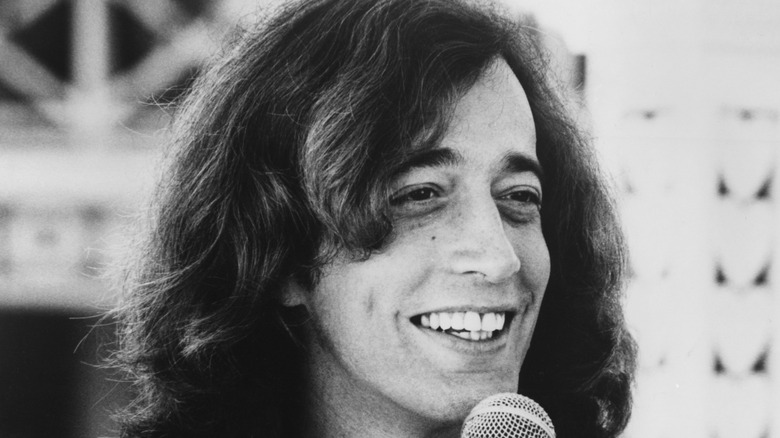The Tragic Death Of Robin Gibb
When it comes to disco, there's no name more synonymous with the genre than the brothers Gibb, also known as the Bee Gees. Formed in 1958 in Australia, and comprised of brothers Barry (the eldest) and twins Robin and Maurice, the Bee Gees early in their careers quickly became known as the first family of harmony (via Billboard). Frequently compared to another vocal group harmonizing their way up the charts, The Beach Boys, the Bee Gees were a regular staple on British radio. And while the popularity of fun, light songs from harmonizing groups would quickly fade by the end of the '60s, the Bee Gees were far from throwing in the towel. By the mid-'70s, The Bee Gees would re-invent themselves into the harbingers of disco, with Robin Gibb's falsetto (via Slate) leading the way.
Born on December 22, 1949, 30 minutes before his twin brother Maurice, on the Isle of Man (via Biography), Robin Gibb (along with older brother Barry and twin, Maurice) began toiling in music early on. With their mother, Barbara a noted gifted singer, and Hugh, their father, a drummer and sometimes band leader, the brothers Gibb seemingly had no other option, but to get into music. In 1956, the brothers, along with buddies Paul Frost and Kenny Horrocks formed The Rattlesnakes.
Rebirth and Disco
Although The Rattlesnakes were short-lived, ending with the Gibb family moving away, the brothers had realized music was in their blood. According to Barry Gibb: "It was the feeling of standing in front of an audience that was so amazing. We'd never seen anything like it. We were very young, but it made an enormous impression. We didn't want to do anything else but make music." (via Bee Gees)
While the Bee Gees had early success in Australia and England, thanks to their manager Robert Stigwood, who also managed Eric Clapton, by the mid-'70's, the group still wasn't breaking through in America (via The New York Post). Stigwood, however, had a plan. Recently purchasing the rights to a story called "Tribal Rites of the New Saturday Night," Stigwood insisted the Bee Gees create a soundtrack for the film. The group, already halfway through recording a new album, was not thrilled with the prospect. Still, Stigwood persisted and the brothers eventually relented.
Before the film's debut, the project was renamed and on December 12, 1977 "Saturday Night Fever” (the film) was released. According to The New York Post, between Christmas 1977 and New Year's day 1978, the "Saturday Night Fever" soundtrack sold over 750,000. The Bee Gees were re-born.
A tragic loss
In 2010, Robin Gibb began suffering from severe abdominal pain. By August of that year, Gibb had emergency surgery performed on his intestine. Just a few short months later, he would announce to the world he was battling colorectal cancer. The subsequent years saw Robin Gibb continue to fight the cancer, finally declaring to the world in March of 2012 that he was in remission and ready to get back to work (via The New York Post) on a project he was completing called "Titanic Requiem," a musical written by Gibb and his son Robin-John. "Titanic Requiem" was a tribute written to commemorate the 100th anniversary of the sinking of The Titanic. When the musical premiered in April of 2012, Robin Gibb was unable to participate as planned. By early April 2012, Gibb had slipped into a coma; a complication from pneumonia he had contracted. On May 20, 2012, Robin Gibb died of kidney failure, according to Yahoo! Entertainment. He was 62.


